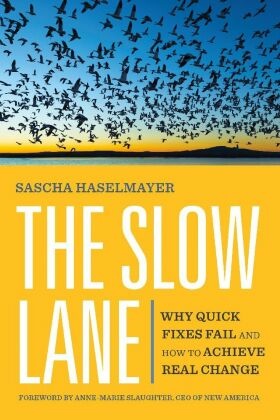The Slow Lane - Why Quick Fixes Fail and How to Achieve Real Change
| Verlag | Penguin US |
| Auflage | 2023 |
| Seiten | 240 |
| Format | 15,4 x 1,4 x 23,6 cm |
| Gewicht | 332 g |
| Artikeltyp | Englisches Buch |
| EAN | 9781523004584 |
| Bestell-Nr | 52300458UA |
Avoid the speed trap! Discover how changemakers can find lasting solutions to urgent social problems through a proven 5-step process for listening thoughtfully, building broad support, and exploring unconventional options.
Society celebrates leaders who promise fast, easy solutions to the world s problems but quick fixes are just mirages that fade, leaving us with the same broken systems. The truth is, effective social change happens through slow, intentional actions. The author, a globally acclaimed social entrepreneur, offers a 5-step process for taking the slow lane to change the lane that gets you to the right place faster:
Listening Listen to build trust, which can change hearts and minds and allow for something new to emerge.Holding the urgency Accept that even in moments of crisis you can move only at the speed of trust instead of rushing into action.Sharing the agency Create an inclusive environment where everyone can lead.Healing democracy Build bridges that allow marginalized people to participate.Maintaining curiosity Be inspired by nontraditional sources.
Using dozens of examples prison reform in England, urban development in Venezuela, healthcare in the Navajo Nation, early childhood education in New York, and many more The Slow Lane shows how, by following the principles taught in this book, readers can create lasting change.
Rezension:
A beautiful journey in the slow lane, an alternative to the autocratic and divisive forms of leadership that respond to complex challenges by opting for the kind of quick fixes that are doomed to fail.
Dr. Philip G. Zimbardo, psychologist and New York Times bestselling author of The Lucifer Effect and coauthor of The Time Paradox and The Time Cure
A must-read for anyone dedicated to sustaining real, positive change on every level.
Darren Walker, President, Ford Foundation
Sascha Haselmayer's book captures our emergent epoch. But instead of seeing catastrophe, he opens up a world of possibilities, a world of forgotten options.
Saskia Sassen, Robert S. Lynd Professor of Sociology, Columbia University

